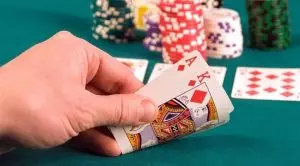 Louise O’Reilly from the Irish republican political party Sinn Féin revealed some HSE figures related to problem gambling in the country at the time she asked Minister for Health Simon Harris for more details on the number of gambling addicts who have received treatment for their problem since 2015.
Louise O’Reilly from the Irish republican political party Sinn Féin revealed some HSE figures related to problem gambling in the country at the time she asked Minister for Health Simon Harris for more details on the number of gambling addicts who have received treatment for their problem since 2015.
Ms O’Reilly explained that according to official reports, there have been no less than 800 cases of problem gamblers who sought help for their compulsive gambling habits from Irish health organisations since 2015. The Minister for Health redirected the request of Ms O’Reilly to the Health Service Executive (HSE) but the government’s agency shared that its own figures are not thorough and accurate enough to show the actual scale of problem gambling in Ireland.
In a reply sent to Ms O’Reilly’s request, the HSE explained that its addiction services have been usually funded for treatment of other addictions such as problematic drug or alcohol use. Still, it revealed that some cases of problem gambling have also received the necessary treatment.
As TheJournal.ie reported, the country’s Government has not been willing to engage with understanding how serious the situation with gambling addiction is in Ireland. As a result, the country is facing what The Dublin Fingal TD called a crisis.
NHE Does Not Have Sufficient Gambling Addiction Data
 At the time when the National Health Executive provided the figures, it revealed that the available numbers were associated with the number of cases reported to the National Drug Treatment Reporting System (NDTRS). However, as explained by the NHE, problem gambling cases reporting to the NDTRS is not obligatory. This is exactly the reason why the figures regarding gambling addictions cannot be considered thorough enough to represent the actual number of problem gambling cases which have received treatment across the country.
At the time when the National Health Executive provided the figures, it revealed that the available numbers were associated with the number of cases reported to the National Drug Treatment Reporting System (NDTRS). However, as explained by the NHE, problem gambling cases reporting to the NDTRS is not obligatory. This is exactly the reason why the figures regarding gambling addictions cannot be considered thorough enough to represent the actual number of problem gambling cases which have received treatment across the country.
Still, the figures provided by the NHE show that there were 208 gambling addiction cases in 2015, 195 in 2016, and 219 in 2017, which makes a total of 622 cases in the three-year period from 2015 to 2017. In some cases, gambling was pointed out as the main problem for which treatment was needed.
For the time being, no final figures are available for 2018. Currently, about 60% of all relevant data is available, with 174 cases of gambling addiction revealed. In other words, there have been at least 800 cases in which people got treatment for problem gambling. Considering the fact that the NDTRS revealed that its records are not accurate enough, the aforementioned figure could be much lower than the actual number.
Unfortunately, there is not sufficient data available on the prevalence of problem gambling on the territory of Ireland, and a much more dedicated study is needed so that the true scale of gambling addiction in the country is revealed. A number of studies have provided figures about the amount lost by Irish gamblers on gambling, with a research carried out by The Economist in 2017 showing that Ireland’s gambling losses amounted to a total of €2.1 billion on an annual basis.
Irish Lawmakers Should Be More Proactive on Tackling Problem Gambling
 According to Ms O’Reilly, it is safe to say that the country is not heading to a gambling crisis but is already in the middle of one. She further noted that authorities should no longer ignore the scale of gambling addiction, as the data was clear and it is Ireland which has the highest online gambling losses per capita on a global scale.
According to Ms O’Reilly, it is safe to say that the country is not heading to a gambling crisis but is already in the middle of one. She further noted that authorities should no longer ignore the scale of gambling addiction, as the data was clear and it is Ireland which has the highest online gambling losses per capita on a global scale.
The Irish lawmakers have been criticised for not really doing anything to prevent the further expansion of gambling among local people. The Gambling Control Bill 2013 was put forward by the Government for some time now, and a revised bill presented by Fianna Fáil in February 2018 making slow progress, the authorities’ lack of action continues.
Experts say that further action is necessary in terms of relevant gambling legislation, with more to be done in terms of tackling excessive gambling among Irish gamblers.
- Author


